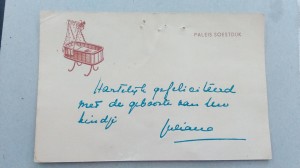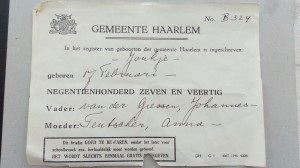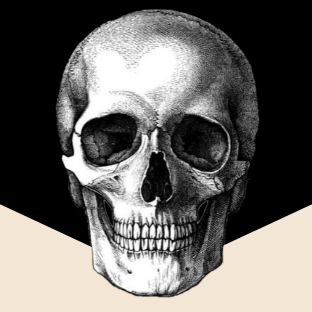One day, a random conversation with a friend named Joukje—pronounced “Yaaook”—led to a discussion about birth certificates. Joukje was born on February 17, 1947 in the Netherlands, exactly a day before the birth of Princess Christina of the Netherlands. To celebrate the birth of the princess, her mother, Queen Juliana, sent a congratulatory card to the parents of every girl-child born in the country that week. Joukje’s parents received one, too. Each card was attached to a pinafore, which was mailed to new parents all over the country. The message of congratulations was sent under a formal letterhead straight from the desk of Paleis Soestdijk.

This led me to dig out my own birth certificate for a closer view. When I first discovered my Indian birth certificate, the details in it took me by surprise. It showed the time, date, and place of my birth, but instead of my name it addressed me only as “baby girl.” What was even more shocking was that the birth certificate didn’t show my mother’s name, only my father’s. Upon a closer look, I noticed that the certificate didn’t even have a section asking for a mother’s name. Puzzled, I did some research to shed light on the discriminatory document.
As it turned out, I was named when I was about four months old. Naming a newborn, my aunt said, was not a rushed event. Such things were done at a leisurely pace and with a ceremony. Per tradition, an astrologer calculated the time, date and place of my birth, and the positions of the stars and planets in the sky in order to determine my rashi, or my zodiac sign. My rashi then dictated the sound that would start my name. That explained why my name did not appear on my birth certificate. Still, there was a burning question about why a mother’s name would be left off the birth certificate. The truth was that the baby belonged to the father and not the mother. The father’s name alone gave the document validity, and without his name, the mother would be denied the birth certificate for her newborn. That was the law. It was only in 2015 that the Supreme Court in India ruled that the mother does not need to divulge her child’s father’s name in order to receive this crucial document.
Curiously, Joukje’s 70-year-old birth certificate not only bore both her parents’ names, but also her mother’s full maiden name in order to capture her full identity.

She was kind enough to show me both the documents. Holding the congratulatory card, a piece of royal history, in my hand, I wondered if the queen’s men traveled from hospital to hospital, and house to house in small Dutch villages, asking if anyone had a brand new baby that week. Then I wondered if the stars and planets held a conference ahead of births in the eastern part of the globe. I chuckled to myself. Suddenly the details, or the lack of, on the certificate seemed less important.
Sharmila Munver
Blog Editor
